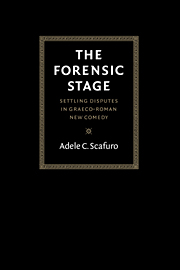Book contents
- Frontmatter
- Contents
- Preface
- Author's note on terminology, transliteration, translation, and texts
- List of abbreviations
- Introduction
- PART I PRE-TRIAL PLAYS
- PART II RECONCILIATION AND ITS RHETORIC
- 3 Arbitration and reconciliation in Athens and Rome
- 4 Scenarios of arbitration and reconciliation in New Comedy
- 5 Redress for sexual offenses in Athenian and Roman law
- 6 The resolution of seduction and rape in New Comedy
- 7 Arguing behind closed doors
- PART III PLAYING ON THE BOUNDARIES OF THE LAW
- APPENDICES
- Works cited
- General index
- Index locorum
7 - Arguing behind closed doors
Published online by Cambridge University Press: 03 March 2010
- Frontmatter
- Contents
- Preface
- Author's note on terminology, transliteration, translation, and texts
- List of abbreviations
- Introduction
- PART I PRE-TRIAL PLAYS
- PART II RECONCILIATION AND ITS RHETORIC
- 3 Arbitration and reconciliation in Athens and Rome
- 4 Scenarios of arbitration and reconciliation in New Comedy
- 5 Redress for sexual offenses in Athenian and Roman law
- 6 The resolution of seduction and rape in New Comedy
- 7 Arguing behind closed doors
- PART III PLAYING ON THE BOUNDARIES OF THE LAW
- APPENDICES
- Works cited
- General index
- Index locorum
Summary
Characters in New Comedy sometimes convene to discuss epiklerate marriages and to argue over the necessity of divorce. Smikrines in Act 1 of Aspis reports the advice of friends that he should marry an epikleros (184-86); in Act n, he discusses the issue with his brother. Another Smikrines, this one appearing in a lacunose scene of Epitrepontes, discusses divorce with his son-in-law (637–99); in the following act, father and daughter take up the issue. In the opening scene of Stichus, Antipho reports that friends have advised him to dissolve his daughters5 marriages (128); he relays this information to his children while urging them to divorce. The characters in these scenes typically dispute the competing claims of law and fairness. Do their arguments reflect those used “behind closed doors” in Athens – or are they dramatically idiosyncratic and distortions of social and legal realities?
In an earlier chapter we examined arguments used in private arbitrations and reconciliations in Athens. We concluded that disputants may have used arguments of fairness more frequently in cases where they sought compensation above restitution and where the law did not seem to cover an alleged offense (chapter 3.1.C). Not all out-of-court settlements in the orators, however, carry along with them the paraphernalia of arbitration; frequently settlements are alluded to without mentioning the presence of a mediating figure. Often they are presented as bribery; occasionally a different basis for agreement can be glimpsed. By incorporating such instances as these into our quarry of evidence, we enlarge our material for comparison with the private arrangements made by the disputants of New Comedy.
- Type
- Chapter
- Information
- The Forensic StageSettling Disputes in Graeco-Roman New Comedy, pp. 279 - 326Publisher: Cambridge University PressPrint publication year: 1997



